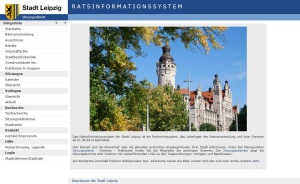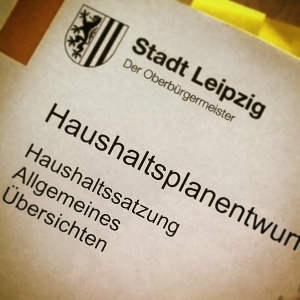Information About Council Work
 Fractions
Fractions
Fractions are groups of at least four city council members who belong to the same political party or voters‘ association, or who declare their affiliation with a fraction. Each city council member can, of course, belong to only one faction.
Only council members who belong to a fraction can participate as voting members in committee meetings. Council members without a fraction can also attend committee meetings but do not have voting rights there. Non-affiliated council members have voting rights only in the council assembly.
Fraction Funding
To ensure that an „after-hours parliament“ like the Leipzig City Council can still operate professionally and that council members can manage the high workload, the city of Leipzig provides financial, spatial, and material resources to the fractions. These resources are used to maintain offices staffed with full-time employees who support the work of the council members in various ways.
Council Assembly
The council assembly is responsible for all matters of local self-government assigned to it by the Basic Law, the Saxon Constitution, and the Saxon Municipal Code.
The council assembly decides, among other things, on all matters of significant political, economic, and social importance for the city. This includes the preparation, amendment, or repeal of development plans, the naming and renaming of districts, streets, squares, public buildings, and facilities. Additionally, the city council decides on statutes, local laws, the land use plan, changes to the municipal area, the budget plan, and measures that affect the city’s financial management beyond the current year.
The council assembly typically meets once a month. You can find the council assembly dates here.
Agenda
The agenda governs the proceedings of the council assemblies. After the mayor’s greeting, they officially open the council assembly. Next, the council’s quorum must be established. The council is quorate if at least half of the voting members are present. Following this, the agenda is confirmed, during which the mayor may note changes in the order of items, postponements, or the removal of items from the agenda. The following agenda items might be of particular interest to the citizens of our city:
Citizen Inquiries
Citizens, associations, and citizen initiatives have the opportunity to ask questions about matters concerning the city of Leipzig. Each questioner is allowed to submit one question, which must be submitted to the Office for Council Affairs at least 15 days before the council assembly. After consultation with the Council of Elders, the mayor decides whether the question will be answered orally during the council assembly or in writing afterward.
Petitions
After preliminary discussions in the Petition Committee, petitions are presented to the city council as a resolution proposal during a public session.
Article 17 of the Basic Law grants everyone the right to address requests or complaints to the relevant authorities and to the representative bodies, either individually or collectively. This allows Leipzig’s citizens to actively participate in city affairs by submitting an online petition.
Urgent Decisions by the Mayor
The municipal code grants the mayor the right to make urgent decisions. They can use this right when delaying a decision would be detrimental to the city. The city council must be informed about the urgent decision afterward.
Election Results
The composition of the city council is determined in local elections, with each election period lasting five years. We are currently in the 7th election period. You can find the results of the 2024 city council election here.
Council Work (Voluntary)
Contrary to what some may believe, city council members are typically not professional politicians; they engage in their municipal political activities voluntarily in their free time. For their work on the city council, members receive an allowance, which is not comparable to the compensation received in state parliaments or the Bundestag.
Work on the Leipzig City Council is time-consuming and comes with significant responsibility. The time commitment required for municipal political work often amounts to 15 to 20 hours per week, as in addition to the monthly council assemblies, members also attend committee meetings, supervisory board meetings, faction meetings, and citizen discussions. Furthermore, they need to process numerous documents, such as proposals, inquiries, and motions, which are essential for their work.
After all, a growing city of half a million people like Leipzig needs to be responsibly managed.
The allowance for city council members is composed as follows:
- The basic monthly amount is €543.80.
- Additionally, the following monthly allowances are provided:
- Faction leaders: €163.10.
- Chairpersons of decision-making and advisory committees (if they are city council members): €81.60.
- The deputy chairperson of the Youth Welfare Committee (if they chair the committee): €81.60.
- A mobility allowance (monthly) equivalent to the value of an LVB monthly ticket for Zone 110.
- Meeting allowances:
- Attendance at the council assembly: €108.80 per meeting.
- Attendance at committee meetings: €54.40 per meeting (only for voting members).
Council Information System (Allris)
 To make the work of the city council transparent and comprehensible for the citizens, the new council information system, Allris, was introduced at the end of the summer recess in 2014. Here, you will find all public proposals, inquiries, and motions, as well as the minutes of the council assembly. The council information system is also an essential tool for city council members in their municipal political work.
To make the work of the city council transparent and comprehensible for the citizens, the new council information system, Allris, was introduced at the end of the summer recess in 2014. Here, you will find all public proposals, inquiries, and motions, as well as the minutes of the council assembly. The council information system is also an essential tool for city council members in their municipal political work.
Leipzig City Budget
 One of the most important topics the city council addresses is the city budget. It details how much money the city will spend on various areas over the next two years. The largest portion of expenses arises from mandatory tasks that the city must perform due to legal obligations. The scope for discretionary decisions that the city council has when preparing the budget is small, given the overall volume of revenues and expenses. However, the decisions made by the council are significant and can have a noticeable impact on the city’s society. This is especially true for voluntary services that a municipality can provide, but is not required to. In this context, the members of the council assembly need to make decisions with foresight and a sense of responsibility. This includes matters such as maintaining social and cultural offerings in the city, providing subsidies for clubs and associations, additional investments in transportation or educational infrastructure, or funding public transportation. These are issues that the people of Leipzig encounter daily.
One of the most important topics the city council addresses is the city budget. It details how much money the city will spend on various areas over the next two years. The largest portion of expenses arises from mandatory tasks that the city must perform due to legal obligations. The scope for discretionary decisions that the city council has when preparing the budget is small, given the overall volume of revenues and expenses. However, the decisions made by the council are significant and can have a noticeable impact on the city’s society. This is especially true for voluntary services that a municipality can provide, but is not required to. In this context, the members of the council assembly need to make decisions with foresight and a sense of responsibility. This includes matters such as maintaining social and cultural offerings in the city, providing subsidies for clubs and associations, additional investments in transportation or educational infrastructure, or funding public transportation. These are issues that the people of Leipzig encounter daily.
The weeks during which the city budget is prepared are among the most labor-intensive for the city council, as many interests must be weighed against each other, and the already limited financial resources of the city must be allocated in a way that creates the greatest benefit for society.
The city’s tasks can be divided into three categories:
- Mandatory Tasks by Instruction: The legislature determines which tasks must be performed and how (e.g., social benefits, passport and ID card requirements, public safety and order).
- Mandatory Tasks without Instruction: The legislature specifies which tasks must be performed, but the city can independently decide how to proceed (e.g., schools, fire departments, wastewater disposal).
- Voluntary Tasks: The city of Leipzig independently regulates all matters of the local community (e.g., sports facilities, cultural institutions).
Citizen Representatives in Districts and Localities
The district advisory councils are formed based on the results of the local elections in the respective districts. The appointment of district advisory council members is carried out by the parties represented in the council assembly. The districts address council proposals related to their respective district, including motions from factions and council members. The votes of the district advisory councils on proposals and motions are communicated to the council assembly, but they are not binding for the city council. Additionally, district advisory councils can designate „important matters“ that must be addressed directly in the council assembly. Therefore, the Leipzig SPD is naturally also represented in the districts.
You can find the members of the district advisory councils here.
In the former localities incorporated in 1999/2000, elections for the existing local councils are held as part of the municipal elections. This means that the election results of the respective party in the city council election do not determine the outcome; instead, the residents of the locality directly elect who will manage the affairs of their locality. The responsibilities of the local councils are regulated by the municipal code and the main statute of the city of Leipzig. The chairperson of the local council is the local mayor. Since August 1, 2001, all local mayors have served in a voluntary capacity. As a result of the territorial reform, the locality constitution was introduced in 14 localities in Leipzig. The election function of local council members is limited to five years. Eligible voters and candidates are citizens residing in the locality. The number of local council members is determined by the main statute. In Burghausen, Hartmannsdorf-Knautnaundorf, Miltitz, Plaußig, Rückmarsdorf, and Seehausen, five members are elected. In Holzhausen, Liebertwolkwitz, Lindenthal, Lützschena-Stahmeln, and Mölkau, seven members are elected. In Böhlitz-Ehrenberg and Wiederitzsch, eight members are elected, and in Engelsdorf, nine members are elected.
You can find the representatives in the local councils here.
